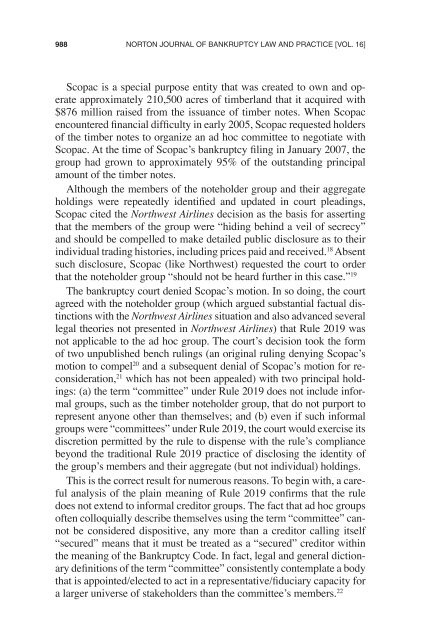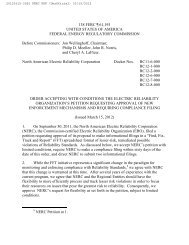Ad Hoc Committees and the Misuse of Bankruptcy Rule 2019
Ad Hoc Committees and the Misuse of Bankruptcy Rule 2019
Ad Hoc Committees and the Misuse of Bankruptcy Rule 2019
You also want an ePaper? Increase the reach of your titles
YUMPU automatically turns print PDFs into web optimized ePapers that Google loves.
988 Norton Journal <strong>of</strong> <strong>Bankruptcy</strong> Law <strong>and</strong> Practice [Vol. 16]<br />
Scopac is a special purpose entity that was created to own <strong>and</strong> operate<br />
approximately 210,500 acres <strong>of</strong> timberl<strong>and</strong> that it acquired with<br />
$876 million raised from <strong>the</strong> issuance <strong>of</strong> timber notes. When Scopac<br />
encountered financial difficulty in early 2005, Scopac requested holders<br />
<strong>of</strong> <strong>the</strong> timber notes to organize an ad hoc committee to negotiate with<br />
Scopac. At <strong>the</strong> time <strong>of</strong> Scopac’s bankruptcy filing in January 2007, <strong>the</strong><br />
group had grown to approximately 95% <strong>of</strong> <strong>the</strong> outst<strong>and</strong>ing principal<br />
amount <strong>of</strong> <strong>the</strong> timber notes.<br />
Although <strong>the</strong> members <strong>of</strong> <strong>the</strong> noteholder group <strong>and</strong> <strong>the</strong>ir aggregate<br />
holdings were repeatedly identified <strong>and</strong> updated in court pleadings,<br />
Scopac cited <strong>the</strong> Northwest Airlines decision as <strong>the</strong> basis for asserting<br />
that <strong>the</strong> members <strong>of</strong> <strong>the</strong> group were “hiding behind a veil <strong>of</strong> secrecy”<br />
<strong>and</strong> should be compelled to make detailed public disclosure as to <strong>the</strong>ir<br />
individual trading histories, including prices paid <strong>and</strong> received. 18 Absent<br />
such disclosure, Scopac (like Northwest) requested <strong>the</strong> court to order<br />
that <strong>the</strong> noteholder group “should not be heard fur<strong>the</strong>r in this case.” 19<br />
The bankruptcy court denied Scopac’s motion. In so doing, <strong>the</strong> court<br />
agreed with <strong>the</strong> noteholder group (which argued substantial factual distinctions<br />
with <strong>the</strong> Northwest Airlines situation <strong>and</strong> also advanced several<br />
legal <strong>the</strong>ories not presented in Northwest Airlines) that <strong>Rule</strong> <strong>2019</strong> was<br />
not applicable to <strong>the</strong> ad hoc group. The court’s decision took <strong>the</strong> form<br />
<strong>of</strong> two unpublished bench rulings (an original ruling denying Scopac’s<br />
motion to compel 20 <strong>and</strong> a subsequent denial <strong>of</strong> Scopac’s motion for reconsideration,<br />
21 which has not been appealed) with two principal holdings:<br />
(a) <strong>the</strong> term “committee” under <strong>Rule</strong> <strong>2019</strong> does not include informal<br />
groups, such as <strong>the</strong> timber noteholder group, that do not purport to<br />
represent anyone o<strong>the</strong>r than <strong>the</strong>mselves; <strong>and</strong> (b) even if such informal<br />
groups were “committees” under <strong>Rule</strong> <strong>2019</strong>, <strong>the</strong> court would exercise its<br />
discretion permitted by <strong>the</strong> rule to dispense with <strong>the</strong> rule’s compliance<br />
beyond <strong>the</strong> traditional <strong>Rule</strong> <strong>2019</strong> practice <strong>of</strong> disclosing <strong>the</strong> identity <strong>of</strong><br />
<strong>the</strong> group’s members <strong>and</strong> <strong>the</strong>ir aggregate (but not individual) holdings.<br />
This is <strong>the</strong> correct result for numerous reasons. To begin with, a careful<br />
analysis <strong>of</strong> <strong>the</strong> plain meaning <strong>of</strong> <strong>Rule</strong> <strong>2019</strong> confirms that <strong>the</strong> rule<br />
does not extend to informal creditor groups. The fact that ad hoc groups<br />
<strong>of</strong>ten colloquially describe <strong>the</strong>mselves using <strong>the</strong> term “committee” cannot<br />
be considered dispositive, any more than a creditor calling itself<br />
“secured” means that it must be treated as a “secured” creditor within<br />
<strong>the</strong> meaning <strong>of</strong> <strong>the</strong> <strong>Bankruptcy</strong> Code. In fact, legal <strong>and</strong> general dictionary<br />
definitions <strong>of</strong> <strong>the</strong> term “committee” consistently contemplate a body<br />
that is appointed/elected to act in a representative/fiduciary capacity for<br />
a larger universe <strong>of</strong> stakeholders than <strong>the</strong> committee’s members. 22



